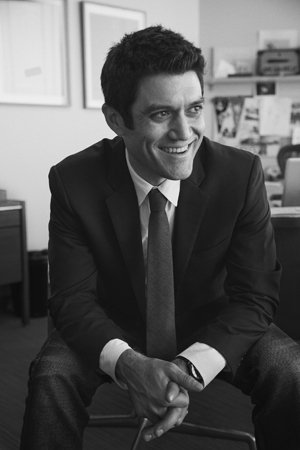Sign up for the daily CJR newsletter.
 Jake Silverstein steps into his new role as editor of the New York Times Magazine at a critical moment. On the heels of his reign at Texas Monthly–which won four National Magazine Awards under his leadership–Silverstein is now tasked with helping an iconic publication redefine itself. The magazine will merge with the Times‘ newsroom, in a sense, and become part of the daily conversation on how big stories are covered. CJR’s Aparna Alluri caught up with Silverstein via email to talk about the transition. (This conversation took place before news hit that Texas Monthly‘s parent company, Emmis Publishing, would file a lawsuit against the NYT for allegedly inducing Silverstein to breach his contract, which was set to expire in February 2015.)
Jake Silverstein steps into his new role as editor of the New York Times Magazine at a critical moment. On the heels of his reign at Texas Monthly–which won four National Magazine Awards under his leadership–Silverstein is now tasked with helping an iconic publication redefine itself. The magazine will merge with the Times‘ newsroom, in a sense, and become part of the daily conversation on how big stories are covered. CJR’s Aparna Alluri caught up with Silverstein via email to talk about the transition. (This conversation took place before news hit that Texas Monthly‘s parent company, Emmis Publishing, would file a lawsuit against the NYT for allegedly inducing Silverstein to breach his contract, which was set to expire in February 2015.)
You’ve risen to the top of your field relatively quickly. How did you get to where you are today? I bribed people! Actually, I think Texas plays a part in this. In many ways, this place is still a frontier. It has the egalitarian, open-door spirit of a frontier. I sound like Rick Perry, but it’s true: If you’re willing to work hard, this is a good place to get ahead.
Magazines have faced their own set of challenges in the last decade as the print industry has struggled to stay afloat. How much of a concern has that been for you? I think most people who love narrative nonfiction went through a depressive period about six or seven years ago, when it seemed unclear whether that kind of writing would be brought along in the gradual print-digital transition.
I’m happy to say that those concerns appear now to have been overblown. Plenty of digital-first outlets are publishing quality longform pieces, and plenty of legacy print institutions–the Times perhaps foremost among them–have demonstrated a keen sense for how to bring narrative pieces alive with digital tools. I think the question that remains is what this evolving new hybrid form will look like and what its values will be.
What changes do you think those challenges have produced? Simply put: There are fewer places that can afford to make the investments necessary to publish a large number of long, deeply reported, artfully told, well-edited, and carefully fact-checked stories.
I think that’s unfortunate, but it’s not sky-is-falling bad. There still are plenty of places that do this kind of work. The financial challenges that declining ad revenues have placed on magazines haven’t themselves produced any good changes; but the reason for those challenges–the rise of a more complex digital media ecosystem in which the role of magazines is slightly diminished–has had some interesting effects. It’s forced magazines to engage more with their readers, for one.
What kinds of stories are you drawn to? I like stories that reveal the world to be the wonderfully strange place that it is–stylish and subjective pieces, fearless reporting that transports me somewhere far away. The stories that get me most excited are the ones that are actual stories, narratives that pull me along. Magazines–unlike papers, unlike news sites, unlike blogs–have a theatrical quality to them. The stories should be little plays.
What’s shaped you as a journalist? This question would take pages to answer. So here’s is a highly selective reply: I’ve learned a lot from the simple power of the crime stories that I’ve worked on at Texas Monthly with writers like Pam Colloff, Skip Hollandsworth, and Michael Hall. You can’t put them down. And yet they also have a serious civic purpose. A piece that I read, many years ago, that helped me find my way as a young writer was a weird, shambling Harper’s story by the fiction writer Denis Johnson about Liberia called “The Small Boys Unit.” It’s an uncomfortably honest account of his misadventures trying to get an audience with Charles Taylor, how he botches this and that along the way. The lesson of that piece was, to borrow a line from Robert Lowell, “All’s misalliance, yet why not say what happened?”
Has America ever needed a media defender more than now? Help us by joining CJR today.






